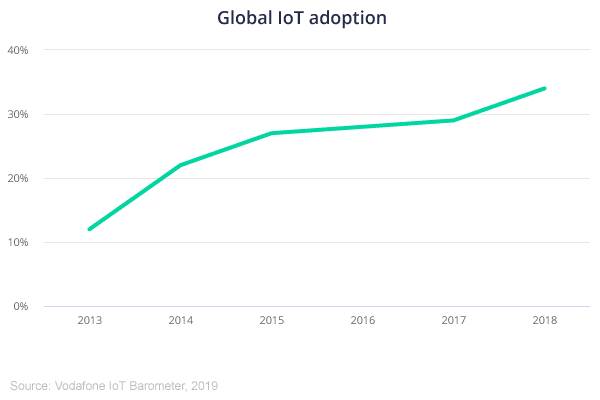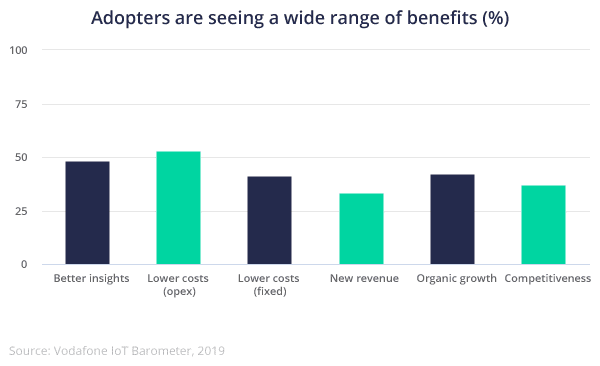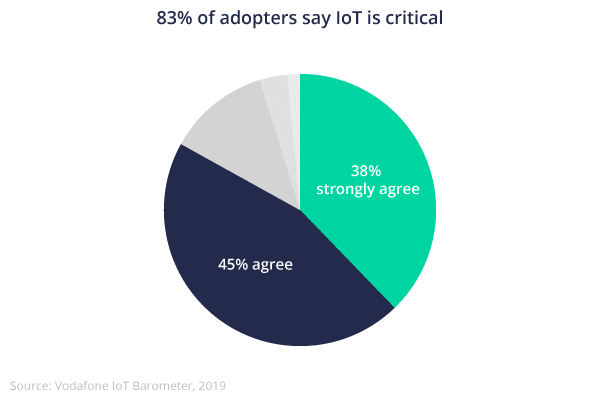It’s 2020, and no longer is IoT a mystical, far-off tech fantasy. Slowly but surely, it’s becoming a household term for businesses—especially the ones that are ahead of the game.
And no wonder. The tech is at its most potent and secure; solutions are easier than ever to implement; and uptake is higher across the board. Not to mention, data—that digital gold gathered by IoT solutions—is at its most valuable.
What does this all mean for IoT? What’s the state of the IoT market right now, and how will it change in 2020? Here are my predictions.

Revenue boosts and savings from IoT will increase
Last year, the average revenue boost from IoT adoption was 22%; and savings averaged around 18 – 26%, with the deeper IoT investments pulling the higher figures.
And in 2020, the numbers will increase at their fastest yet. Through advancements in IoT tech and the standards that govern them, we’ve got devices with more computing power, longer battery life, and incredible range.
The businesses who implemented their IoT solutions in years gone past will continue to see their profits pick up now, as IoT becomes even more efficient and powerful.

And its accessibility is at an all time high. With all of the connectivity options and expertise available, you don’t need to in-house your IoT anymore; especially with the effectiveness of portals and platforms that allow you to control your equipment with ease. Couple that with its affordability today: no longer is IoT the exclusive stomping ground of big businesses with big budgets. Inexpensive sensors and hardware make it easy for SMEs to get involved.
The value of IoT is already sky high—but this year, we’ll see it become truly mainstream.
IoT will become more mission-critical
It’s no longer just about being ahead of the game; more and more businesses are building their products and services around IoT, putting it at their core. In 2019, 83% of IoT adopters said their IoT applications were mission-critical, and 8% said they’d have no chance of doing what they do without IoT.
This is because of the wide variety of benefits companies are relying on IoT for—ranging from accurate data collection and increased productivity to customer loyalty. In particular, with data as valuable as it is today, the capability to collect data isn’t a luxury or convenience anymore; we’re at a point where some are suggesting it has a place on company balance sheets . Businesses that are data-blind risk falling behind and best, and total failure at worst.

IoT security will ramp up
Last year, 65% of IoT adopters said that cybersecurity was no more an issue than with any other tech; which is no doubt what’s led to 84% of adopters saying their confidence in IoT has grown.
This is likely because businesses are learning how to implement best practices and security bottom lines, or outsourcing their security to dedicated 3rd-party providers. Which is really good news for the industry, because security has typically been a concern for those on the fence about IoT.
As businesses run more live projects and increase their investments into IoT, security measures will increase to match.
One to watch: Smart Cities
2020 will be the year of the smart city. With today’s dual-focus on environmental awareness and quality of life, governments are making a big push for lower emissions, safer streets, and smoother transport systems. To do that, they need remote monitoring, data insights, smart machinery—all the things IoT is known for. Not to mention: for a true smart city environment, everything needs to work together; which means everything needs to be connected. And that’s more viable than ever before, with such a wide spread of connectivity types available, especially those like the new Wi-Fi 6 and 5G.
This is quite the opportunity for IoT providers, considering the public sector’s tendency to outsource their tech requirements. There are currently 21 megacities (urban centres with over ten million people) in the world, and we’re expected to hit 29 by 2025. All of these cities, according to Cisco, could cut up to 30% of their total energy usage by integrating the right green solutions.
In essence: if you’re ready to innovate, the smart city market is ready to be tapped.
All in all, we’ve watched IoT go from strength to strength over the last year, and 2020’s looking like it’ll take the industry even further.
Businesses that started their IoT journeys are seeing big payoffs; and the door’s still open for those who haven’t. Want to talk about what IoT can do for you? Drop us a line and let’s get started!
Contact us




Comments are closed.